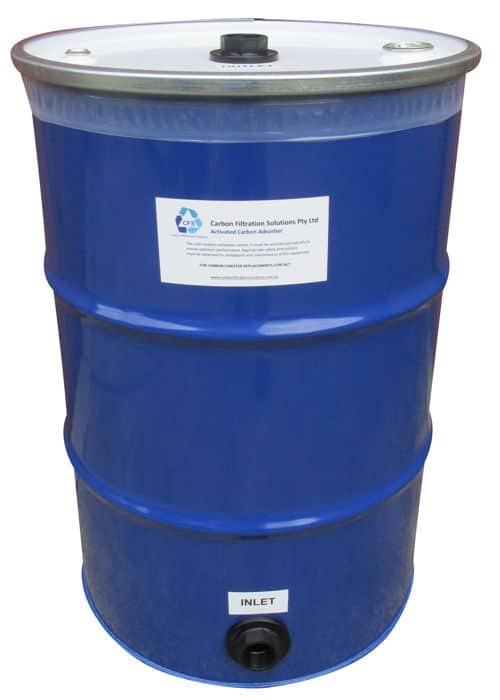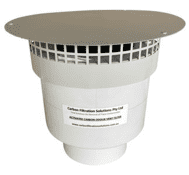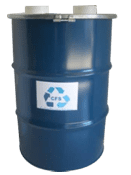If you have been looking for an effective and safe way to remove contaminants from your home’s indoor air space, you’ve probably encountered the terms activated carbon filters and charcoal water filters. Since both of them are widely used, you’ll most likely have a hard time choosing one.
You might be torn between choosing a carbon filter for your home or using a charcoal filter. Well, you’ll probably never know the answer if you’re just looking for which is better than what. Knowledge comes from understanding what these systems are and, most importantly, what sets one apart from the other.
Carbon vs Charcoal Filters FAQ
What is a charcoal filter? How does it work?
A charcoal filter is one of the commonly used media of adsorption filters for air quality control and contaminant reduction in your home. Its inherent ability to adsorb the most organic chemicals built its name in the market. When it comes to capturing and containing gaseous compounds present in the indoor air space, activated charcoal filters work quickly and efficiently to trap these pollutants and contaminants.
In some instances, the charcoal will be treated with additional chemicals during the activation process, using a chemical known as potassium permanganate. This chemical (potassium permanganate) helps an activated charcoal filter in enticing the reaction between the carbon media and the oxidation of polar or lower molecular weight compounds.
What is an activated carbon filter? Does it work the same as charcoal filters?
A carbon filtration system works through a method called adsorption, wherein pollutants in the air are treated and trapped inside the pore structure of a carbon media. Activated carbon filters are full of other substances, such as organic matter that fills the raw carbon material with microscopic holes or pores in the filter media.
Adsorption takes place when organic compounds in the air or water chemically react with the activated carbon, causing them to stick to the filter. The process is designed to effectively capture contaminants within its filtered media. The more porous the carbon filter is, the more pollutants and contaminants it will capture.
Usually, the carbon filter media activates when a positive charge attracts negatively charged contaminants present in the air. Some carbon filters are constructed with pure carbon, while the vast majority are made with other chemical additives that add up to the size of the carbon filter and make it more porous for the containment and trapping of pollutants.
Since carbon is a powerful absorbing agent, it can take in contaminants and draw them into the filter media quickly. Its particles or granules work to provide a large surface area structure on the filter media to maximise the ability to capture contaminants. With this, your overall indoor air quality will be improved.
Carbon filters are notably used to remove contaminants and other hazardous compounds in your home air purification systems.
Which is better? Charcoal or Carbon?
When looking for an air filtration for your home or office, it all comes down to choosing between activated carbon and activated charcoal filters. You will most likely hear both of these specific characterisations when discussing about air filtration system, leading you to several questions on whether they both mean the same thing or if they each have their own meaning when used in filtering contaminants the indoor air.
Some people say that activated charcoal and activated carbon are the same thing, with both terms being synonymous with each other. So, if some people talk about activated charcoal or activated carbon, they are discussing about the same filtration process.
If both of them are different, however, knowing and understanding which is better than the other is actually not that complicated. You just have to identify your needs and requirements to determine which air filtration system will work best for you. Also, you need to learn more about the proper treatment of your application before you go through the process.
What are the benefits of using a carbon filtration system?
Before you purchase carbon filters for your personal indoor environment, it is important to know the benefits associated with using them in your air filtration system. You can use these purifiers to get rid of unwanted or harmful contaminants in your air that can pose a hazard to your health.
As an air purification system, it can be used to trap known allergens and impurities, such as dust, lint, mould spores, smoke, pet hair, common household chemicals, benzene, and other VOCs. Activated carbon filters also help eliminate unpleasant odours, keeping indoor air fresh and pleasing.
When you use activated carbon and HEPA filters together, they can trap 99.97% of small particles as well as most larger particles, especially spores. If you suffer allergies or aggravation from impure air, including secondhand smoke, you can particularly benefit from this type of filter. If you are a smoker or you live with one, using an activated carbon filter as your home air purification system can provide unparalleled benefits to your respiratory health.
Activated carbon filters remove a significantly higher amount of air pollutants and contaminants than other air filtration systems. They can be used alone or in conjunction with other filters, like HEPA filter, to reduce the amount of impurities in the indoor air of homes, hospitals, museums, airports, air intake systems, and other office buildings.
High levels of activated carbon increase the filtrations system’s lifetime. It will just require several replacements to keep emitting fresh air longer. Upgraded filters are infused with other compounds to remove even more hazardous pollutants from the air like carbon monoxide, ethylene oxide, and ozone. Some are even adept at preventing bacteria buildup that may occur naturally over time.
Regardless if you choose a basic or an advanced model of carbon filter, you and the people around you will benefit from it.
Found the one you’ve been searching for? Buy now!
If you want to take advantage of the benefits and perks of activated carbon filters, secure one at Carbon Filtration Solutions Pty Ltd. Our cost-effective products will definitely improve your indoor air quality, boost your productivity, and help you become healthier.
ALC Water Filters
Activated Carbon water treatment filtration is a low-cost effective solution for environmental legislation compliance requiring cleaner factory discharges.
Odour Vent Filter
This is a deep bed Activated Carbon Filter. It is a low cost, prefabricated self-contained unit and is designed to absorb hydrogen sulfide and other unpleasant odours.
PureAir Vapour Odour
These Activated Carbon Canisters are commonly used to control gases and tank vent odour either within the industrial workplace or vented to atmosphere.
Filter Housing & Bags
XL10 bag filters for applications requiring high flow rates, gross particle removal and low pressure drop. Our standard filter housing accepts all major brands of bags.



